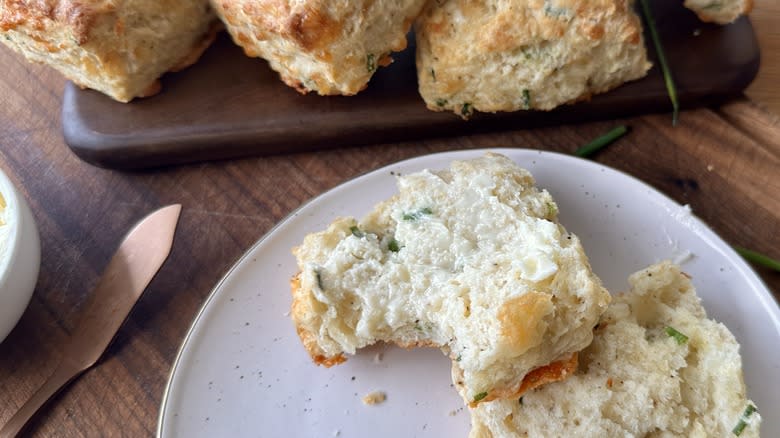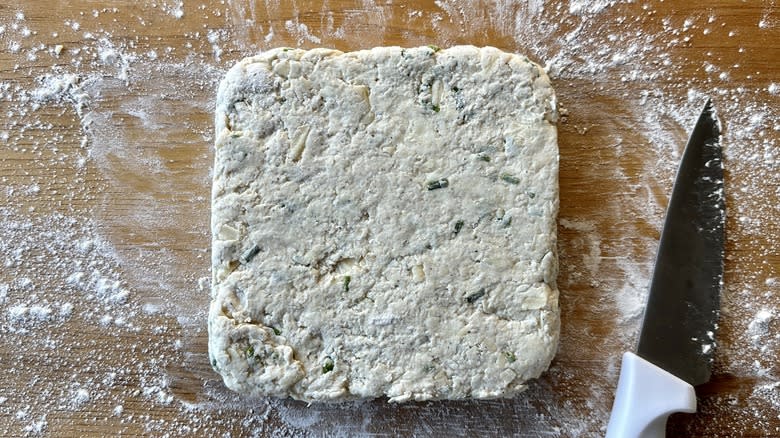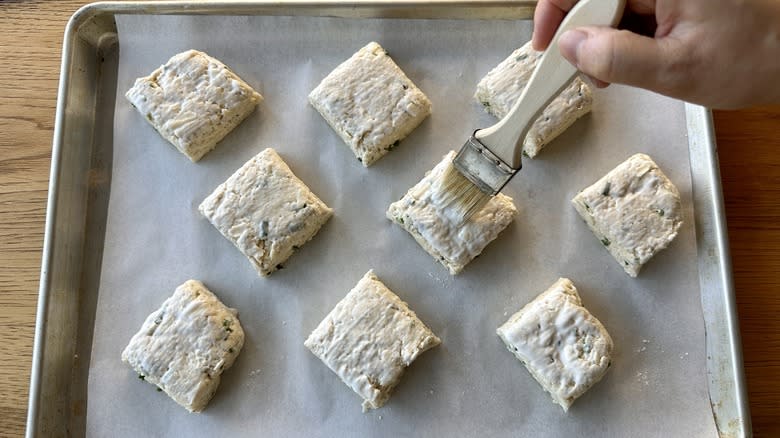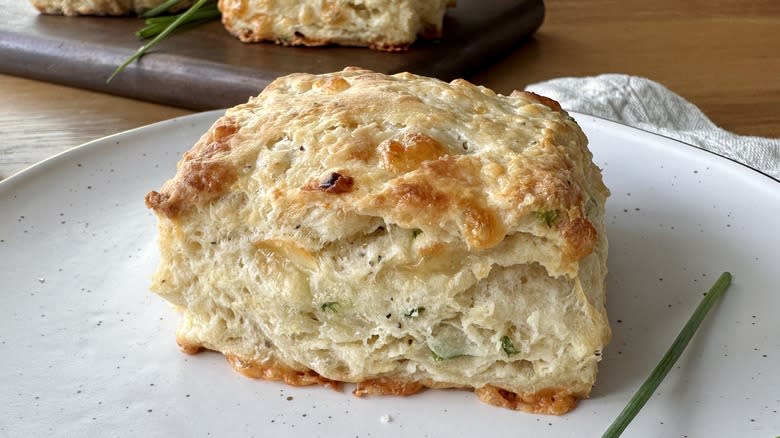Tender, Fluffy Cream Cheese Cheddar Biscuits Recipe

Buttery, tender, and oh-so-fluffy, there's arguably nothing better than a warm biscuit — especially when that biscuit is made with cream cheese, cheddar cheese, buttermilk, and fresh chives. Served up with eggs and bacon for breakfast, made into sandwiches for lunch, or enjoyed as a side with dinner, biscuits like these are always a welcome addition to the table.
If you haven't made biscuits before or just haven't mastered them yet, you're in luck. This recipe is incredibly easy to bring together, with just one bowl and only about 20 minutes of hands-on time needed for perfectly feathery, golden brown biscuits every time.
One key step? Grating frozen butter. For these biscuits, frozen butter is grated using the large holes of a box grater, then tossed into the dry ingredients for an easy distribution of perfectly sized bits of fat. This eliminates any risk of warming the butter while working it into the dough, ensuring that those bits of cold butter will remain studded throughout the biscuits for flaky layers after baking. This is an easy way to cut fat into a variety of baked goods, from biscuits to pie dough.
Recipe developer Katie Rosenhouse swears by this technique. "I used to cut in butter using a pastry cutter or food processor, but once I switched to grating frozen butter, I never looked back," she says. "It's easy, consistent, and less cumbersome than traditional techniques when working with small batches."
Read more: Styles Of Regional BBQ In The US
Gather The Ingredients For Fluffy Cream Cheese Cheddar Biscuits

To make these biscuits, you'll need all-purpose flour, baking powder, granulated sugar, baking soda, kosher salt, and frozen butter. The combination of baking powder and baking soda results in a fluffy interior, with even browning as the baking soda reacts with the buttermilk in the mix. You'll also need black pepper for a hint of spice, although this can also be substituted with cayenne pepper if you'd prefer a little more heat.
Cubed cream cheese is dispersed into the dry ingredients, adding tenderness and a subtle tangy flavor to the biscuits. Cheddar cheese and chives are added for additional flavor, although the cheese can be substituted with any type you prefer, and the chives for scallions or chopped parsley. Buttermilk brings it all together for a dense dough that's easy to shape and cut.
Step 1: Prep A Baking Sheet

Line a baking sheet with parchment paper and set aside.
Step 2: Combine The Dry Ingredients

In a large bowl, stir 2 ? cups flour, baking powder, sugar, baking soda, salt, and pepper to combine.
Step 3: Add Cream Cheese

Add cream cheese to dry ingredients in small dollops.
Step 4: Work In The Cream Cheese

Work in the cream cheese with your fingertips until only small bits remain visible.
Step 5: Grate Butter And Cheese

Use the large holes of a box grater to grate butter and cheddar cheese.
Step 6: Add Butter, Cheese, And Chives

Add grated butter and cheese to the dry mixture along with the chives, tossing to combine.
Step 7: Add Buttermilk

Add 1 cup buttermilk and stir lightly just until absorbed.
Step 8: Knead Lightly

Transfer the shaggy dough to a clean surface and knead lightly until just combined; don't overwork it.
Step 9: Press Dough Into A Square

Lightly dust the surface with flour and roll or press the dough to a 7-inch square, about 1 inch thick.
Step 10: Cut Biscuits

Cut into 9 squares.
Step 11: Transfer To The Baking Sheet

Transfer biscuits to the prepared baking sheet, spacing at least 2 inches apart.
Step 12: Refrigerate

Refrigerate biscuits for 15-30 minutes.
Step 13: Preheat The Oven

In the meantime, preheat the oven to 425 F.
Step 14: Brush With Buttermilk

Brush tops of biscuits with remaining 1 tablespoon buttermilk.
Step 15: Bake Until Golden

Bake for 16-18 minutes until golden brown, then transfer to a wire rack.
Step 16: Serve Warm

Serve biscuits warm.
What Pairs Well With Cream Cheese Cheddar Biscuits?

These biscuits can be served any time of day, year-round. They pair perfectly with scrambled or fried eggs, bacon, and potatoes, or they can be doused with sausage gravy for breakfast or brunch. Split them and fill them up with ham, turkey, cheese, or your desired fillings for a buttery sandwich at lunch, or for dinner, use them to mop up any last bites of chili, soup, stew, or barbecue. The possibilities are endless.
These biscuits also make a great accompaniment to holiday meals. Swap the chives for ribbons of sage in the fall or winter months, or the cheese for Gruyere for a sophisticated twist. You can even drizzle them with honey for a sweet touch. Baked until golden brown, they'll be gobbled up in no time.
Prefer round biscuits? Press or roll out the dough as directed, then use a round cutter to cut out circles. Gently push together the scraps and continue to cut out rounds until all the dough has been used. Bake until golden, adjusting the baking time as needed for larger or smaller biscuits.
Can You Freeze Cream Cheese Cheddar Biscuits?

Looking for a make-ahead option? The unbaked biscuits can be prepared and cut in advance, then refrigerated in an airtight container for up to 2 days. They can also be frozen for longer storage.
To freeze, flash freeze the cut raw biscuits until firm on a baking sheet, then transfer to freezer-safe zip-top bags for up to 3 months. Thaw in the refrigerator overnight, then bake as directed (the biscuits may need a couple of extra minutes in the oven).
Leftover baked biscuits can also be frozen. Freeze in airtight containers for up to 3 months, then bring to room temperature before placing in a 350 F oven until warmed through. Leftover biscuits can also be stored in an airtight container in the refrigerator for up to 5 days and reheated before serving. With these make-ahead options, there's always a way to have a stash of biscuits at the ready.
Why Aren't My Biscuits Fluffy?

If your biscuits tend to come out heavy, there are a few possible reasons why. When it comes to measuring your dry ingredients, make sure to spoon and level your flour for an accurate amount. Too much flour in the mix can weigh things down, leading to dry or heavy biscuits. When working in the fat, make sure your cream cheese and butter are cold. Warm fat will melt into the dry ingredients, and you'll lose out on those feathery, flaky layers you're looking for. After adding the buttermilk, be gentle about kneading the dough. Overworked biscuit dough can lead to gluten development, meaning you'll end up with a dense, rubbery result instead of a tender, fluffy one.
Do your biscuits come out cakey? When adding the buttermilk, it can be tempting to add more liquid to bring the biscuit dough together. Make sure you only add what's called for — the ingredients should just barely come together into a smooth dough, without being sticky. Too much liquid will lead to an overly cakey result.
Tender, Fluffy Cream Cheese Cheddar Biscuits Recipe

Prep Time: 35mCook Time: 16mYield: 9 biscuitsIngredients
2 ? cups all-purpose flour, plus additional for rolling
2 teaspoons baking powder
1 teaspoon granulated sugar
? teaspoon baking soda
1 teaspoon kosher salt
? teaspoon ground black pepper
4 ounces cream cheese, cubed
? cup unsalted butter, frozen
4 ounces sharp cheddar cheese
? cup chopped chives
1 cup + 1 tablespoon buttermilk, divided
Directions
Line a baking sheet with parchment paper and set aside.
In a large bowl, stir 2 ? cups flour, baking powder, sugar, baking soda, salt, and pepper to combine.
Add cream cheese to dry ingredients in small dollops.
Work in the cream cheese with your fingertips until only small bits remain visible.
Use the large holes of a box grater to grate butter and cheddar cheese.
Add grated butter and cheese to the dry mixture along with the chives, tossing to combine.
Add 1 cup buttermilk and stir lightly just until absorbed.
Transfer the shaggy dough to a clean surface and knead lightly until just combined; don't overwork it.
Lightly dust the surface with flour and roll or press the dough to a 7-inch square, about 1 inch thick.
Cut into 9 squares.
Transfer biscuits to the prepared baking sheet, spacing at least 2 inches apart.
Refrigerate biscuits for 15-30 minutes.
In the meantime, preheat the oven to 425 F.
Brush tops of biscuits with remaining 1 tablespoon buttermilk.
Bake for 16-18 minutes until golden brown, then transfer to a wire rack.
Serve biscuits warm.
Read the original article on Tasting Table.
